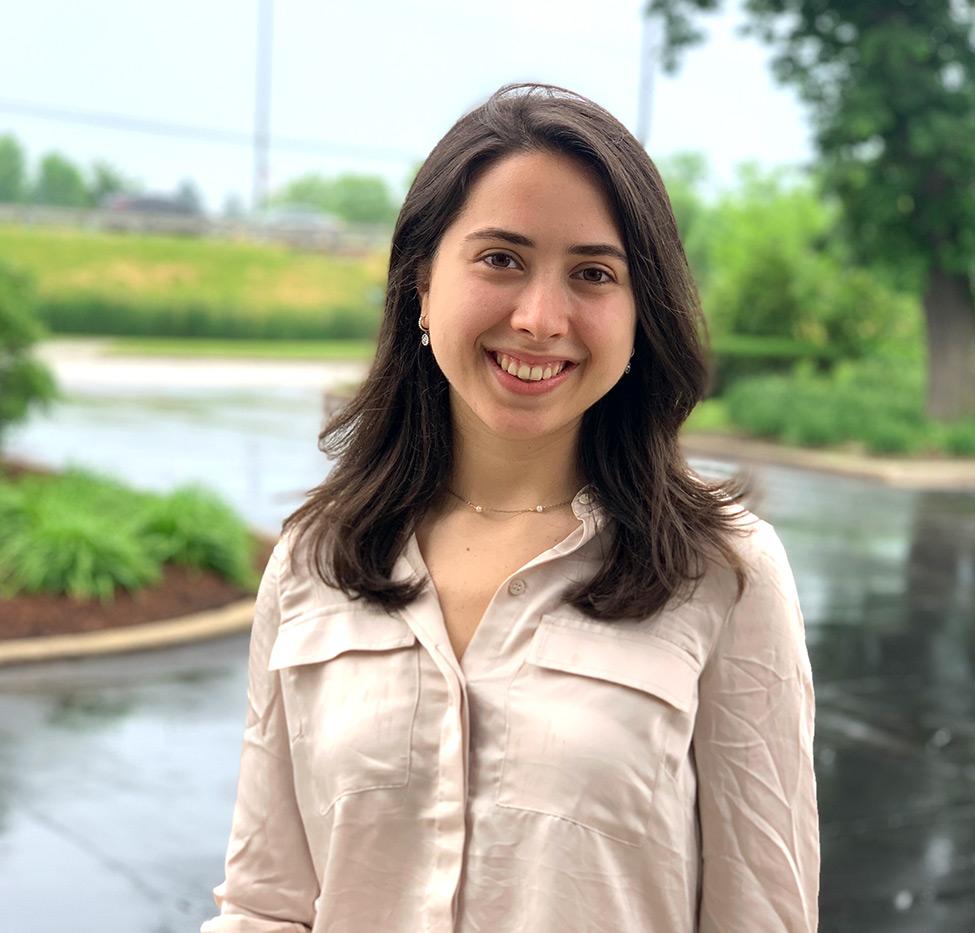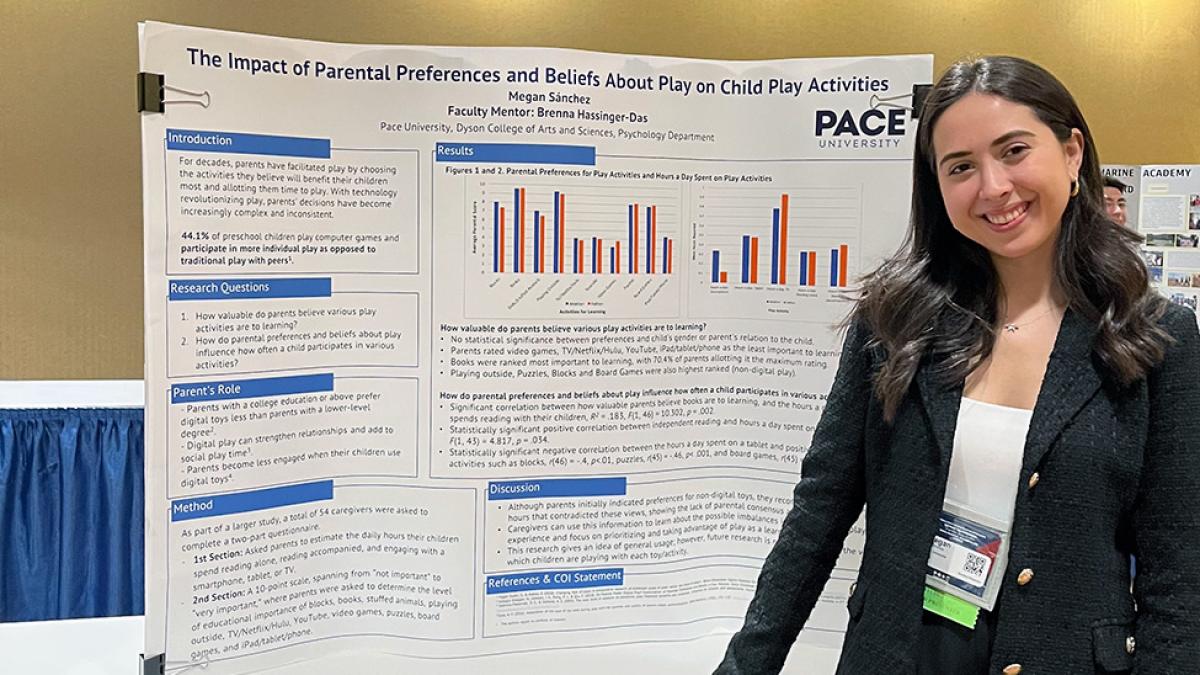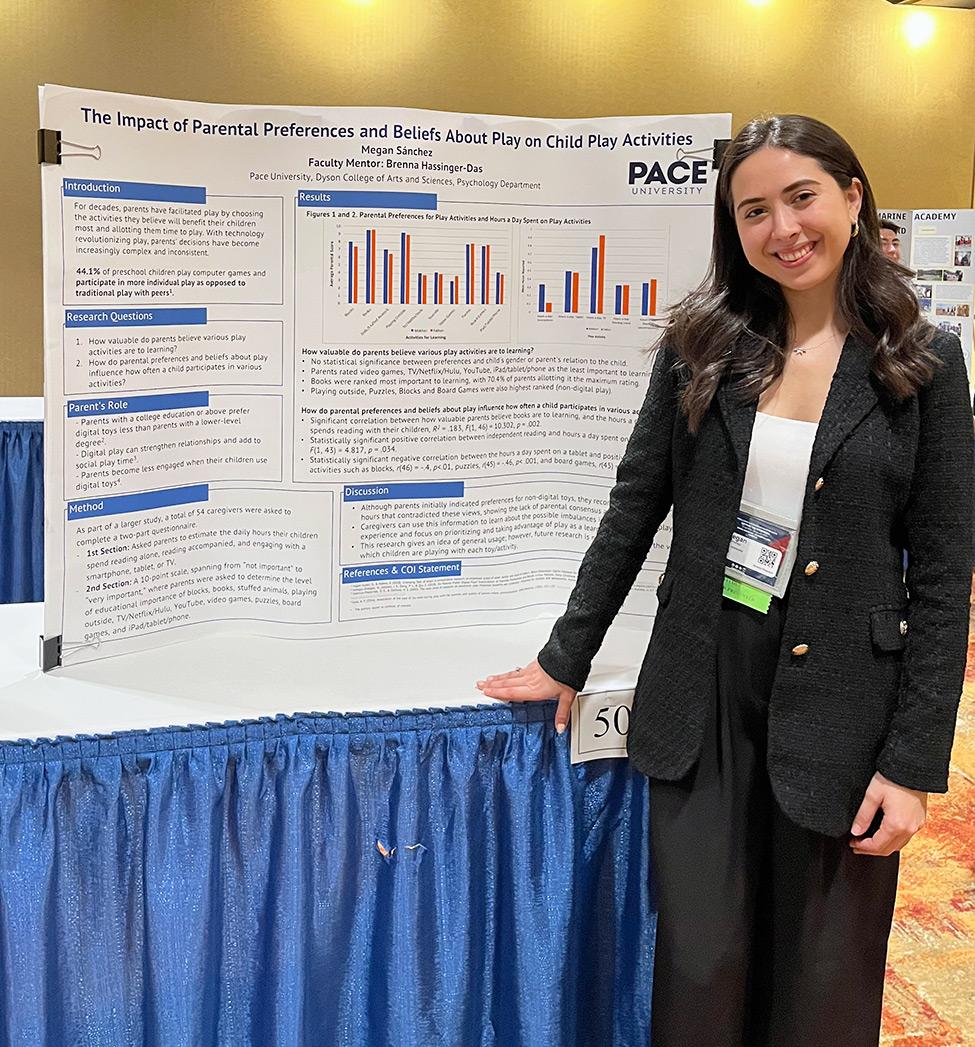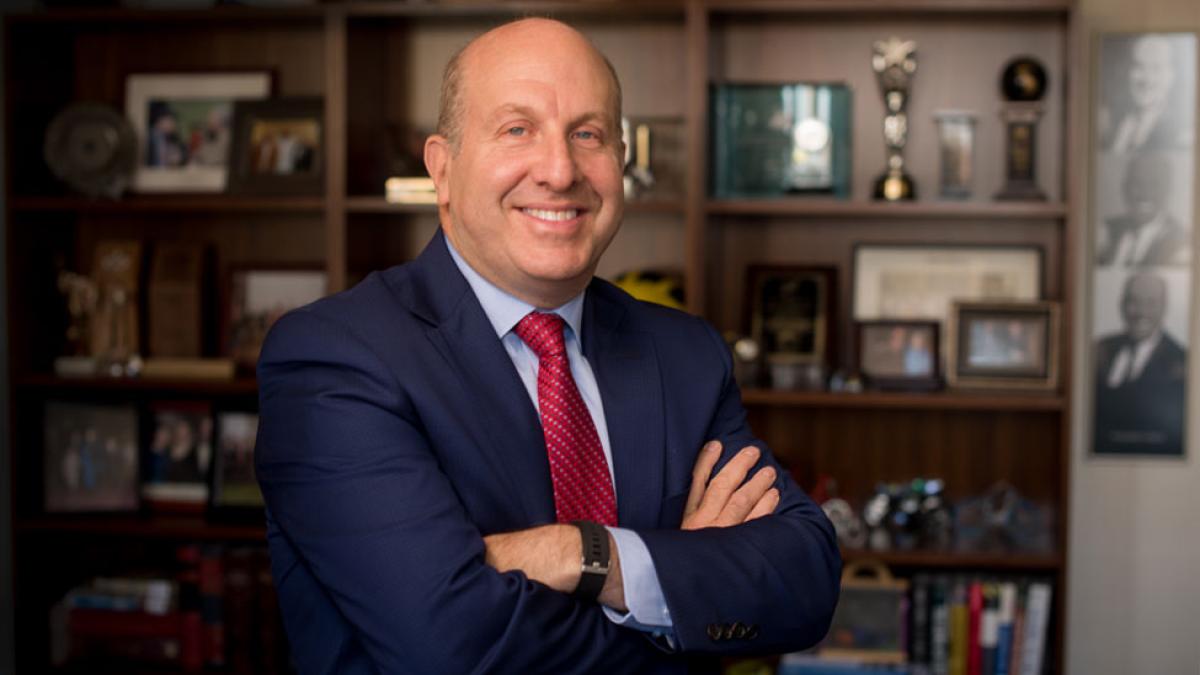
Shaping the Future of Child Development: Q+A with Megan Sanchez '24
Psychology major Megan Sanchez '24 shares her research on the impact of parental beliefs on children's play experiences and discusses her aspirations for a future in research and clinical psychology.


Megan Sanchez
Class of 2024
Through an initiative with Pace University’s Center for Undergraduate Research Experiences (CURE), Megan Sanchez recently presented research to leaders from across higher education at the annual conference of the Middle States Commission on Higher Education (MSCHE), entitled The Impact of Parental Preferences and Beliefs About Play on Child Play Activities.
Please tell us more about your research and how this experience was meaningful to you.
In short, my research sought to understand the impact of parental beliefs on children’s play experiences. The landscape of child-oriented research is continuously evolving, inundating parents and caregivers with a plethora of criticisms and recommendations regarding toys. Despite not being a parent, I have found the growth of data to be both inconsistent and overwhelming for caregivers. My research interests lie in the actual choices parents make when encouraging play and discerning how these decisions align with their preferences.
Having the opportunity to spearhead a research project has been a deeply rewarding experience, allowing me to present my findings at conferences attended by professionals and fellow student researchers. My recent attendance at both the Middle States Commission on Higher Education and the Greater New York Conference on Behavioral Research provided insight into a variety of research topics within my field and facilitated a learning opportunity to understand emerging research in other disciplines. I am very thankful to Pace’s CURE and Professor Brenna Hassinger-Das, PhD, my faculty mentor, for their consistent support and motivation throughout this transformative journey.
How did you become interested in pursuing a Bachelor of Arts in Psychology?
My decision to pursue a degree in psychology was rather unexpected. Growing up, I really enjoyed theater and was fascinated with exploring the nuances of every character and following their growth throughout the plot. Although I didn’t pursue theater in college, psychology resonated with me due to its resemblance to the character work I engaged in for various roles. The flexibility of the major also encouraged me to be curious and understand the many ways psychology can be applied, and I quickly discovered that my true passion was exploring child development and the intricate and complex dynamics of caregivers and community interactions. Pursuing a BA in Psychology has been incredibly gratifying, introducing me to a supportive and driven community of professors and fellow students.

Why did you choose to attend Pace?
I found myself particularly attracted to Pace due to the ideal location, the financial assistance I was provided, and the diverse academic opportunities offered. As a student who was counting on the support of my family back home in the Dominican Republic, these aspects were critical in my decision. Pace not only aligned with my educational goals, allowing me to explore different careers with the support of mentors and fellow students, but it also transformed my goal into a reality.
What have your experiences been like with the New York Psychology Department? What faculty have been instrumental in your academic journey?
One of the most influential aspects of my experience with the Psychology Department has undoubtedly been the people. Reflecting on my academic journey, particularly with my psychology courses, my memories are filled with engaging discussions with peers and inspiring anecdotes from my professors. Professor Hassinger-Das stands out as a pivotal figure in my academic support system, as she has played a crucial role in shaping my path as an aspiring psychologist and researcher, sharing her experiences and guiding me through my college journey. Under Professor Hassinger-Das’s mentorship, I have not only acquired valuable research skills, but also gained the confidence and experience to pursue graduate training in clinical psychology. The mentorship I have received from her and other faculty members at Pace has significantly reinforced my belief in the benefit of mentorship throughout college.
What activities or student organizations you have been involved with? What internships have you had as a student?
I have always loved being part of the Pace community, joining the Latin American Student Organization, Her Campus, the Welcome Center as a tour guide, and Residential Life as a resident assistant.
Pursuing a Bachelor of Arts in Psychology has proven to be incredibly gratifying, introducing me to a supportive and driven community of professors and fellow students.
Last summer, I had the opportunity to complete a clinical psychology internship at a private practice based in Chicago named Advanced Therapeutic Solutions for Anxiety, which specializes in treating selective mutism and severe anxiety disorders. The experience of participating in both group and individual therapy sessions, along with taking on the role of a therapeutic aid and learning the administrative side behind a private practice, was an invaluable hands-on experience that solidified my passion for clinical work. I obtained this position through Pace University’s Handshake portal after participating in all of the resume workshops and seeking guidance from a career advisor.
Are there any challenges you have faced that you overcame and are proud of, and can share?
I was born and raised in Santo Domingo, the capital of the Dominican Republic, and moved to New York for my college education, exposing me to plenty of culture shock, but also heightening my awareness of cultural values that had impacted my personality and worldview. I became familiar with the struggles and opportunities that come with assimilating to a new country, and taught myself how to adapt, picking up the habit of code-switching and grappling with what it meant to be Dominican American and maintaining strong ties to both countries. I was also raised in a multicultural home, where the fusion of Latino culture with the influence of my American mother, who underscored the importance of independence and perseverance, shaped my perspective on life and relationships. Further, I relied on my friends and fellow Latinos at Pace to understand that this was a very common experience and found peace knowing I was accompanied by an entire community of students.
What would you like to do upon graduation/what are your career goals?
After graduating, I hope to pursue a PhD in clinical psychology, aiming to continue evolving my passion for both research and clinical practice. In graduate school, I plan on diving deeper into child development research, with a specific focus on comprehending the diverse influences of caregivers and community factors on various aspects of development. Balancing the desire to contribute to therapeutic spaces, push the boundaries of research, and engage in educational practices, pursuing a doctorate aligns with my career aspirations and overarching goals.
What advice would you like to give to our current students?
Every once in a while, remember to look back and appreciate all the ways you have changed and everything you have accomplished. There will always be more to do and more ways to improve, so take a second, celebrate, and keep going.
Upward Mobility Outside the Ivy League
President Krislov pens a letter to the Wall Street Journal editor about upward mobility outside of Ivy Leagues.

In A Year Of Consequential Elections, Colleges—And College Students—Have A Crucial Role To Play
President Krislov writes in Forbes about the crucial role colleges and college students play in a year of consequential elections.
Senate Resolution No. 1667: Pace University Women's Lacrosse Team
New York State Senate Majority Leader Andrea Stewart-Cousins and members of the Westchester state delegation on Tuesday honored Pace University's women's lacrosse team at the New York State Capitol. The Senate delegation congratulated the Pace University Women's Lacrosse Team on their historic achievement.

The Tonight Show Starring Jimmy Fallon With Guest Christopher Briney
Alumni Christopher Briney ’20 was recently a guest star on The Tonight Show Starring Jimmy Fallon talking about his role in the new “Mean Girls” film.
Who Ya Gonna Call? A New Yorker’s Go-To Guide for Who to Yell At and How to Get Things Done!
Assistant Vice President for Public Affairs NYC Sean Coughlin provides expert insight to W42ST about who New Yorkers should call and how to get thing done around the city.
Exemption For Edgemont From New Village Rules Sparks Controversy In Greenburgh
Mid-Hudson News reports New York State Senate Majority Leader Andrea Stewart-Cousins asked Pace University to conduct a study on the Greenburgh Town Board opposition to an amendment in the state's village incorporation law. The Majority Leader also sought recommendations from Pace to assist her in crafting legislation.
DEI Opponents Are Using A Civil Rights Act Section To Go After A VC Fund That Invests In Businesses Owned By Women Of Color: ‘It’s A Very Clever Game Plan’
Professor Randolph McLaughlin provides expert insight to Fortune about opponents of workplace diversity programs increasingly banking on a section of the Civil Rights Act of 1866 to challenge equity policies as well as funding to minority-owned businesses.
"Huge Monetary Award": Legal Experts Warn Jury May Hit Trump Hard To "Shut Him Up" Amid New Attacks
Professor Bennett Gershman speaks with Salon about Donald Trump facing trial again in New York to determine additional damages for defaming former Elle magazine columnist E. Jean Carroll in 2019 when he denied her sexual assault allegations.
The Road To Salt Reduction
Adirondack Explorer writes about how residents brought nine lawsuits under the approved a constitutional amendment establishing a state right to a “clean and healthful environment,” according to a tally of the cases compiled by the Elisabeth Haub School of Law at Pace University.